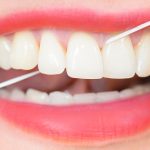The temporomandibular joint acts like a sliding hinge, connecting your jawbone to your skull. When this joint is injured or damaged, it can lead to a localized pain disorder called temporomandibular joint (TMJ) syndrome.
The main symptom of TMJ syndrome is pain or stiffness in the jaw joint and in the surrounding areas. Other symptoms can include:
- Difficulty chewing
- Ear pain or ringing of the ears (tinnitus)
- Shoulder or neck pain
- Popping or clicking sound coming from the jaw
- Headaches or migraines
- Blurred vision, dizziness or vertigo
The exact cause for developing TMJ syndrome is difficult to determine. There are many factors that can contribute to this condition. In some cases, pain may be the result of a jaw injury or another medical condition such as arthritis. In other cases, it can be caused by correctable action such as poor posture or excessive gum chewing. In many cases, TMJ syndrome is the result of habitually clenching or grinding of the teeth. Stress and anxiety can also play a role in the onset of the condition.
TMJ syndrome can occur on one side of the jaw or both. It is usually a temporary condition and in most cases symptoms can be relieved with self–care and home remedies. Taking anti-inflammatory medications and applying ice or cold compresses to the jaw are suggested ways to relieve pain. Eating soft foods and avoiding chewing gum while pain is present is also recommended. Additionally, practicing relaxation techniques and self-massage or stretching techniques have proven effective to reduce pain associated with TMJ syndrome. If these practices are not effective, your dentist can have you fitted for a dental splint or mouth guard to maintain proper alignment of the teeth and prevent grinding. In extreme cases, surgery may be necessary to treat the condition.
If you are experiencing symptoms associated, you can speak to your doctor or dentist about treating the condition.
To make an appointment at Flushing Hospital’s Dental Department, please call 718-670-5521.
All content of this newsletter is intended for general information purposes only and is not intended or implied to be a substitute for professional medical advice, diagnosis or treatment. Please consult a medical professional before adopting any of the suggestions on this page. You must never disregard professional medical advice or delay seeking medical treatment based upon any content of this newsletter. PROMPTLY CONSULT YOUR PHYSICIAN OR CALL 911 IF YOU BELIEVE YOU HAVE A MEDICAL EMERGENCY.









 An estimated 1 million Americans attempt suicide each year. It is the 10th leading cause of death in the United States. Ninety percent of people who committed suicide had treatable mental health disorders that went unnoticed. Suicides can be prevented if signs associated with the mental health disorder are recognized and addressed immediately.
An estimated 1 million Americans attempt suicide each year. It is the 10th leading cause of death in the United States. Ninety percent of people who committed suicide had treatable mental health disorders that went unnoticed. Suicides can be prevented if signs associated with the mental health disorder are recognized and addressed immediately.